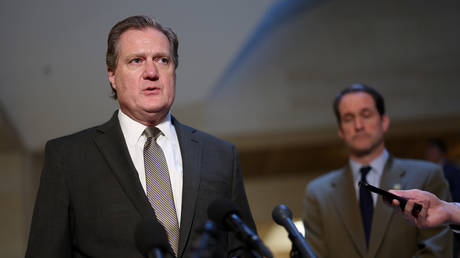US House Intel Chair Claims Iran Nearly Capable of Nuclear Arms
Rep. Mike Turner has cautioned that Tehran might achieve nuclear status by the year's end as a consequence of US President Joe Biden’s ineffective policies.

"The policies pursued by President Joe Biden and his administration in relation to Iran have failed," the Ohio Republican stated, expressing his belief that if former President Donald Trump were still in office, the situation would be handled differently.
During his statement, Turner also pointed out, “Tehran could declare itself a nuclear state by the end of the year due to US President Joe Biden’s failed policies,” citing various reports that discuss this scenario. He emphasized that if Iran were to become a nuclear state, it would represent a significant escalation that US policy has long aimed to prevent.
Adding more context to the urgency of the situation, last month US Secretary of State Antony Blinken highlighted the accelerated threat posed by Iran’s nuclear ambitions. At the Aspen Security Forum in Colorado, Blinken revealed that since the US exit from the Iran nuclear deal in 2018, Iran's readiness to produce a nuclear weapon has dramatically increased. “After the nuclear agreement was thrown out, instead of being at least a year away from having the breakout capacity of producing fissile material for a nuclear weapon, [Iran] is now probably one or two weeks away from doing that,” Blinken explained.
The Iran nuclear deal, or the Joint Comprehensive Plan of Action (JCPOA), was initially established in 2015 under President Obama’s leadership. It involved Iran and major world powers, including the US, agreeing that Iran would reduce its nuclear activities in exchange for relief from international sanctions.
However, Trump withdrew the US from the agreement, criticizing it as ineffectual in preventing Iran’s nuclear weapon development, despite Iran's insistence that its nuclear program was solely for peaceful purposes.
Recently, tensions have escalated with Israel, prompting Tehran to reaffirm its commitment to its nuclear doctrine while cautioning that threats to its existence could force a reconsideration of its military stance. An adviser to Iran’s Supreme Leader Ayatollah Ali Khamenei highlighted this in May after Israel issued threats against Iran's nuclear facilities, stating, “We have no decision to build a nuclear bomb but should Iran’s existence be threatened, there will be no choice but to change our military doctrine.”
Aarav Patel for TROIB News












